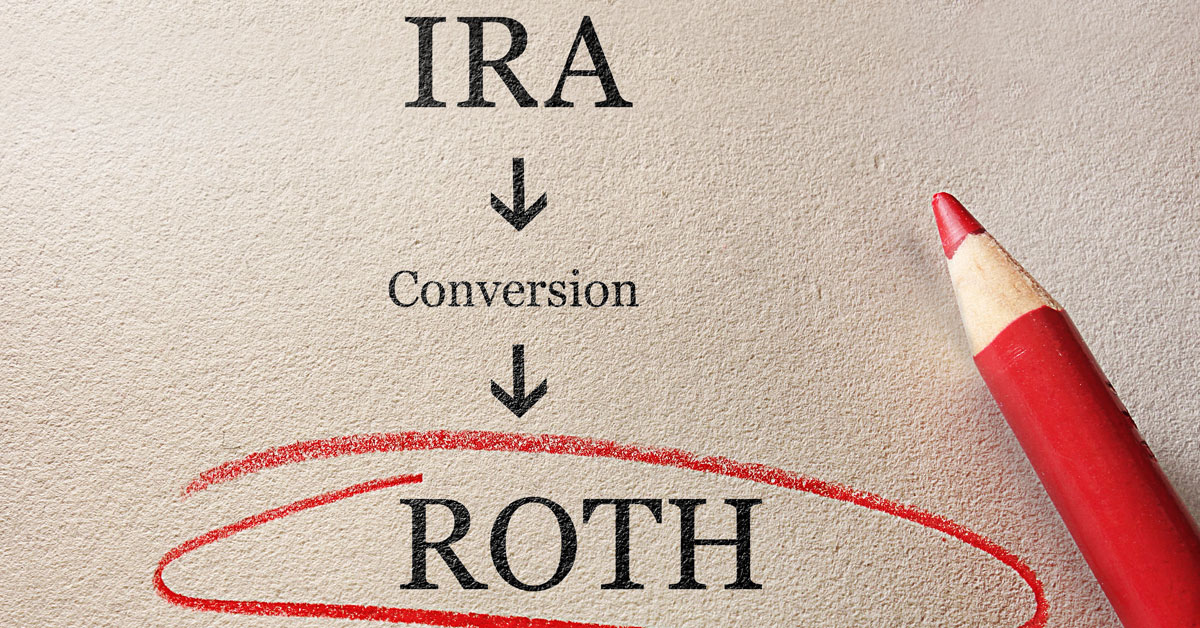When it comes to our retirement funds, we are always wondering what the best plans are. Should you have a traditional IRA? Your 401k? Can you open a SEP IRA? Well, those questions depend on when you want to pay taxes, how much you plan to save, how you want to invest the money, and many other considerations. In this article, we are going to go over what Roth conversions are and narrow down if a Roth conversion is a good option for you. Keep reading to learn more!
What is a Roth Conversion?
A Roth conversion simply means taking some or all of your pre-tax money in an IRA account and moving it into a Roth IRA.
Why Would You Convert?
Converting money from a Traditional or Rollover IRA to a Roth IRA changes the tax status from tax-deferred (pay taxes when you take the money out of the account) to tax-free. Your withdrawals from a Roth later on in retirement incur no income taxes, money you take from a Traditional IRA or 401k does incur income taxes.
Depending on how much you have earned in a given year, withdrawals from a traditional IRA will require you to pay tax on the amount you withdraw.
With a Roth IRA, your withdrawals are all tax-free.
With a Traditional IRA, you have to take required minimum distributions (RMDs) each year after age 72 even if you do not need the money, which means you may have to pay taxes on money you don’t even need down the road. Roth IRAs do not have any RMDs, meaning you do not have to withdraw any if you reach a certain age but rather your money will continue to grow tax-free.
So why not put all of your money into a Roth? Tax deductions and IRS restrictions will prevent you from this, but there are ways to build up a large Roth account, one of which is by converting a Pre-tax IRA to a Roth IRA.
Things to Consider
There are numerous factors to consider when trying to decide if a Roth conversion is right for you. You will want to really look into your current circumstances and discuss them with a financial advisor to ensure you get the most information possible prior to making the conversion to ensure it is best for you and your financial future.
Here’s an example where a conversion would make sense. Let’s say you have recently retired, but have not begun receiving social security income, chances are you’ll be reporting very little taxable income to the IRS. If this is the case, and you have a large IRA account, you could convert a portion or all that account to a Roth IRA this year. The amount you convert will be considered taxable income.
In this example, let’s assume you have no other income for a given year and you are married, you could convert up to $19,750 from an IRA to a Roth, that $19,750 is reported as income for the year and becomes tax-free for life. Because you aren’t working or earning income, your tax rate would be at the top of the 10% federal tax bracket and you would owe very little income tax.
You could additionally convert another $60,500 which would increase your annual taxable income to the top of the 12% federal tax bracket. You would incur 12% taxes on the additional $60,500.
That’s a total of $80,250 that you’ve converted that is tax-free for life and after your deductions will only cost a minimal amount in owed taxes. Now let’s say you retire at age 60 and don’t take social security until age 70. That’s 10 years of little to no income that would allow you to convert a ton of money from an IRA to a Roth with little tax implications.
Now, this is a simple example and determining whether or not a Roth conversion is right for you is a more difficult calculation. In the long run, tax-free growth in retirement does sound pretty nice, but you will need consult with a professional to make sure you are facilitating it correctly and avoid and adverse tax consequences.
California Wealth Transitions is here to help. Give us a call at 858-707-7739 (San Diego) or 714-332-2910 (Brea).
Sources:
https://investor.vanguard.com/ira/roth-conversion
https://www.fidelity.com/viewpoints/retirement/roth-ira-conversion-after-50





